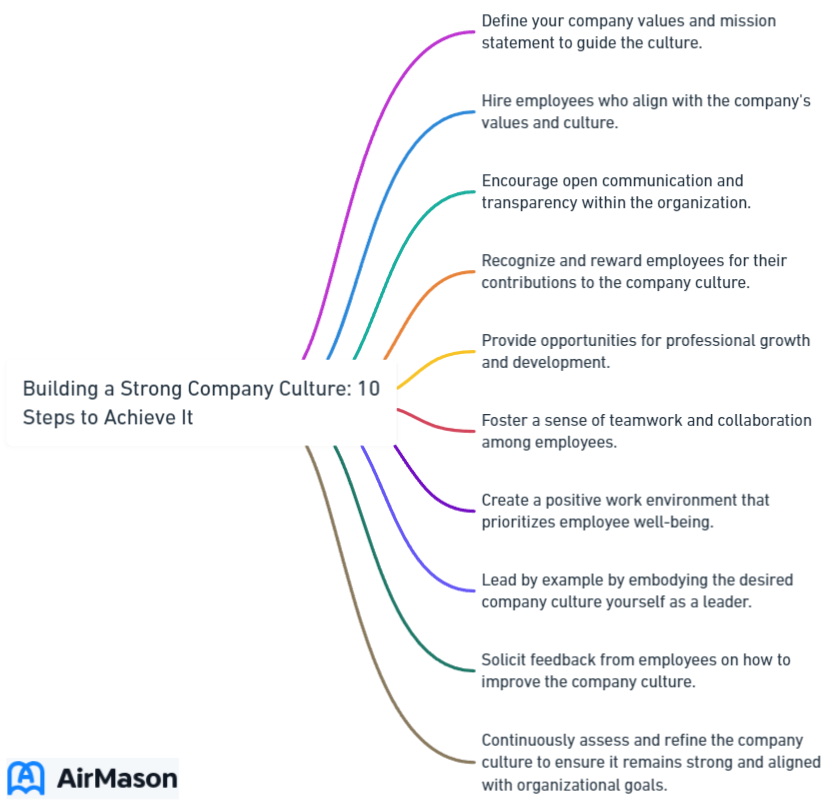![Building a Strong Company Culture 10 Steps to Achieve It [2023]](https://images.blog.airmason.com/wp-content/uploads/2023/10/Building-a-Strong-Company-Culture-10-Steps-to-Achieve-It-2023.png)
Imagine a workplace where employees are engaged, productive, and genuinely happy to come to work each day. That’s the power of building a strong company culture! In this blog post, we’ll explore the importance of building a positive company culture and provide a 10-step guide to help you achieve it, from identifying core values to recognizing employee achievements. Let’s dive in and start transforming your workplace culture for the better!
Key Takeaways
- Create a strong company culture through shared values and open communication
- Encourage feedback, promote teamwork, and prioritize employee development for success
- Reward achievements to motivate employees and nurture a positive work environment
Understanding the Importance of Company Culture
A great company culture has a profound impact on employee engagement, retention, productivity, and ultimately, business success. But what is company culture exactly? It is an environment that supports driven, creative individuals and encourages collaboration between team members. Workplace culture, also known as corporate culture, is created by establishing shared goals and values, fostering collaboration among employees, and establishing policies, procedures, and decision-making processes. The advantages of a strong organizational culture are clear: Employee Engagement, Retention, Productivity, and Overall Business Success are all positively affected.
Developing a strong company culture starts with:
- Identifying core values
- Crafting a vision and mission statement
- Encouraging open communication and collaboration
- Promoting a healthy work-life balance
- Investing in employee development and growth
- Implementing diversity and inclusion initiatives
- Recognizing and rewarding employee achievements
When employees are immersed in company values and good company culture, it brings the team together. This unity around a shared mission fosters a robust and resilient work environment.
Moreover, understanding the company’s values can help employees ensure that their own values align with those of the employer, so they can be successful and fulfilled in their role. Setting up a strong company culture paves the way for the long-term success of your organization.

Identifying Your Core Values
Defining core values is a crucial step in building a successful company culture, as they provide a strong foundation and set the tone for employee behavior and decision-making. Clear goals around a company’s culture are essential to ensure that it is actively implemented and experienced in the workplace. Creating a solid foundation for your company culture begins with identifying and defining your organization’s core values.
Core values can include attributes such as:
- Integrity
- Innovation
- Teamwork
- Accountability
- Customer focus
These values guide the way your organization operates and help create an environment where employees feel engaged, motivated, and aligned with the company’s mission. Moreover, having well-defined core values can aid in decision-making and ensure that your company stays true to its company’s values, even during challenging times.
As your company grows, it’s crucial to continue reinforcing and refining your core values. This helps ensure that new hires understand and embrace your organization’s culture, and it sends a clear message to existing employees that the company’s values remain a top priority. A strong culture supportive of your organization’s success is built by consistently emphasizing the importance of your core values.
An Organization’s Culture
An organization’s culture forms the bedrock of its identity and operations. It encompasses the shared values, beliefs, and norms that guide the behavior and interactions of its members. This culture permeates through every facet of the organization, from its leadership style to its approach to problem-solving. It sets the tone for how employees collaborate, innovate, and adapt to challenges. An organization’s culture plays a pivotal role in attracting and retaining talent, as individuals tend to gravitate towards environments that resonate with their own values and work ethic. Furthermore, it significantly impacts the overall morale and productivity levels, ultimately influencing the organization’s success and longevity. Therefore, nurturing a positive and inclusive culture should be a paramount concern for any forward-thinking organization.
Creating a Vision and Mission Statement

A clear vision and mission statement offer invaluable direction and purpose, helping to ensure employees are working towards the same goals and objectives as the company, contributing to a healthy company culture. A vision and mission statement, which offer a clear understanding of the company’s goals and objectives, can inspire and motivate employees to perform their best.
Companies with a mission have been proven to outperform those without one, and a toxic company culture can hinder the success of a company. Managers and executives can help employees understand their contribution to a positive work environment by demonstrating how the company’s mission statement and values create roles that evoke feelings of pride and accomplishment.
Crafting a compelling vision and mission statement requires careful consideration and input from various stakeholders within the organization. It is essential to ensure that the statement accurately reflects your company’s values and long-term objectives. In doing so, a powerful tool is created that aligns employees with the company’s mission, fostering a strong organizational culture.
Fostering Open Communication and Collaboration

Fostering open communication within the organization can have several benefits:
- Spark creativity
- Facilitate effective problem-solving
- Create a positive work atmosphere
- Improve company culture
Communication norms play a key role in shaping company culture.
A friendly, open communication style can lead to strong relationships and a more positive work environment, which can encourage employees to perform better.
Encouraging Employee Feedback
Encouraging employee feedback provides an opportunity for ongoing enhancement and shows that the company highly regards its employees’ thoughts. One inspiring example of fostering open communication is Samsung, which invested in remarkable spaces between floors to draw employees from their offices, leading to an amazing mingle culture.
Technology can provide us with a range of helpful tools for soliciting and managing employee feedback, such as:
- Online feedback surveys
- Mobile survey tools
- Email solicitation
- Feedback management platforms
- Pulse surveys
Not encouraging employee feedback in an organization can lead to several potential drawbacks, including:
- Lack of clarity and context
- Potential for abuse or toxic behavior
- Incomplete feedback loop
- Decreased employee engagement
- Missed opportunities for development
- Increased stress and morale issues
All of these can have a negative effect on the workplace.
Promoting Teamwork
The rewards of promoting teamwork are plentiful: increased productivity, a sense of belonging, and a stronger company culture. Companies can foster an environment of teamwork by encouraging collaboration, offering team-building activities, and celebrating team successes. Companies can ensure employee engagement by fostering enthusiasm and encouraging voluntary participation.
Offering incentives can also be an effective way to foster collaboration among team members. It is important to strike a balance between encouraging participation and not forcing it upon employees, as this can lead to resentment, alienation, and a lack of morale.
How to Maintain Company Culture
Maintaining company culture is a critical aspect of fostering a healthy and productive work environment. To effectively preserve the essence of a company’s culture, it’s imperative to start by clearly defining and articulating its core values and mission. These foundational elements serve as guiding principles for employees, helping them understand the company’s ethos and what is expected of them. Regular communication and transparency play a pivotal role in this process. Ensuring that every member of the organization is aware of the company’s culture and understands their role in upholding it fosters a sense of unity and shared purpose.
Establishing a Healthy Work-Life Balance

Creating a healthy work-life balance can help foster employee satisfaction, reduce stress, and enhance overall well-being. Signs like unhealthy work-life balance, bad management styles, high employee turnover and improper communication are all indicators of a poor company culture. It is important to be aware and avoid such companies. Workplace flexibility can help employees feel more satisfied in their jobs, reduce stress, and increase morale, all of which can lead to increased productivity.
Employees consider professional development opportunities, flexible work schedules, and mental health support essential for fostering a positive company culture. Flexible working arrangements, like flexible hours and remote working options, can effectively enhance productivity. Establishing a healthy work-life balance can bring you greater satisfaction, reduce stress, and improve your overall well-being.
Prioritizing Employee Development and Growth

Investing in employees can create a positive company culture by:
- Making employees feel valued and empowered to reach their professional goals
- Demonstrating a commitment to their success
- Resulting in greater job satisfaction
- Improving retention
Providing Professional Development Opportunities
Offering professional development opportunities can equip employees with new skills and knowledge, leading to improved performance and further career development. There are plenty of amazing professional development opportunities for employees to explore, such as:
- Joining professional organizations
- Attending networking events and industry conferences
- Participating in self-awareness training
- Receiving coaching
- Engaging in performance reviews
- Enrolling in formal degree programs or workshops
- Pursuing certificates or credentials
- Receiving training in management, leadership, technical skills, and communication.
Research shows that organizations that offer professional development have employees who are 15% more engaged and have 34% higher retention rates. Investing in professional development opportunities can help to foster a growth mindset, increase employee satisfaction, and reduce turnover – all of which can lead to a successful organization.
Supporting Career Advancement
Supporting career advancement within the organization can help retain top talent and cultivate a culture of ongoing learning and growth. Companies that actively support career advancement demonstrate a commitment to their employees’ success, which can lead to increased job satisfaction and retention.
By providing resources, training, and opportunities for career growth, companies can cultivate a culture of continuous learning and improvement. This not only benefits individual employees but also contributes to the overall success and strength of the organization.
Implementing Diversity and Inclusion Initiatives

Diversity in company culture can foster a healthy work environment, inspire creativity, and drive innovation. Having a diverse workforce is advantageous as it brings a variety of perspectives to the table, enabling us to:
- Come up with creative solutions to any project or problem
- Think outside the box
- Challenge the status quo
- Embrace different ideas and viewpoints
- Improve decision-making processes
- Enhance collaboration and teamwork
By embracing diversity, we can create a more inclusive and successful work environment.
Working towards building a culture of diversity and inclusion involves striving to achieve goals like increasing diversity hiring, improving the retention rate of diverse employees, and ensuring a larger percentage of our workforce feels a sense of belonging. Establishing goals on inclusion and belonging when constructing a culture of diversity can aid in fostering an inclusive culture.
Recognizing and Rewarding Employee Achievements

Recognizing and rewarding employee achievements can energize our team, encourage them to perform even better, and strengthen their commitment to our company culture. Rewarding and recognizing employees is a proven way to keep them motivated and loyal. Research has found that when this is done properly, the possibility of retaining staff increases by 63%. Additionally, 87% of corporate recognition programs emphasize tenure.
Companies can foster a culture of success and achievement by showing appreciation for employees’ efforts and hard work. This not only boosts morale and motivation but also reinforces the desired company culture, making it a powerful tool for organizational success.
Continuously Monitoring and Nurturing Company Culture

Starting to develop your culture at the earliest and maintaining a continuous monitor and nurture of the company culture can result in:
- Lower turnover rates
- Reduced retention costs
- Heightened productivity
- A boost in team morale
Making changes is not an instant process. It could require months or even years to reach the desired outcomes.
Employees who understand the company’s expectations and perform their job well can make a meaningful contribution to the company culture. Management must actively listen to employee concerns and thoughtfully consider them, even if company policy cannot be altered in response to each one.
Two Benefits of Positive Values at the Workplace
Embracing and promoting positive values at the workplace can yield numerous advantages for both employees and the organization as a whole. Firstly, fostering an environment rooted in positive values enhances employee morale and satisfaction. When individuals feel that their workplace upholds principles such as respect, integrity, and collaboration, they are more likely to feel valued and appreciated. This, in turn, leads to higher levels of motivation and engagement, resulting in increased productivity and overall job satisfaction. Secondly, positive values create a conducive atmosphere for teamwork and cooperation. When a company’s culture encourages open communication, trust, and mutual respect, employees are more inclined to collaborate effectively, sharing ideas and leveraging each other’s strengths. This collaborative spirit not only leads to improved problem-solving but also promotes a sense of unity among team members, ultimately driving the company towards its common goals. In essence, the integration of positive values into the workplace fosters a more harmonious and productive work environment, benefiting both the individuals and the organization as a whole.
Summary
Building a strong company culture is an ongoing journey that requires commitment, effort, and continuous improvement. By identifying core values, creating a vision and mission statement, fostering open communication and collaboration, promoting teamwork, establishing a healthy work-life balance, prioritizing employee development and growth, implementing diversity and inclusion initiatives, and recognizing and rewarding employee achievements, you can transform your workplace into a thriving environment where employees are engaged, productive, and happy. Start today and unlock the potential of your organization!
Frequently Asked Questions
How do you establish a strong company culture?
To establish a strong company culture, define core values, encourage open communication and lead by example, create opportunities for employees to get to know one another, prioritize respect and employee development, and develop a plan for working the culture into the day-to-day work experience.
What are the 3 C’s of company culture?
The Three C’s of Company Culture are Communication, Connection, and Celebration. Culture, Consistency, and Communication all play an important role in creating an environment that fosters loyalty and productivity. When employees feel connected, empowered, and motivated, they are more likely to remain loyal and productive.
What defines a strong company culture?
Open and effective communication, unified purpose, employee recognition, and clear leadership are all key components of a strong company culture that encourages an atmosphere of collaboration and success. When these elements come together, they create the ideal environment for employees to thrive and achieve great things.
How does a healthy work-life balance contribute to a positive company culture?
A healthy work-life balance is essential for employee satisfaction, reducing stress levels, and promoting overall well-being – all factors that together create a positive company culture.
How can organizations promote diversity and inclusion in the workplace?
Encourage diverse hiring, create programs that support employee retention and create a culture of inclusion where everyone feels welcome and accepted – these are essential steps to promoting diversity and inclusion in the workplace.